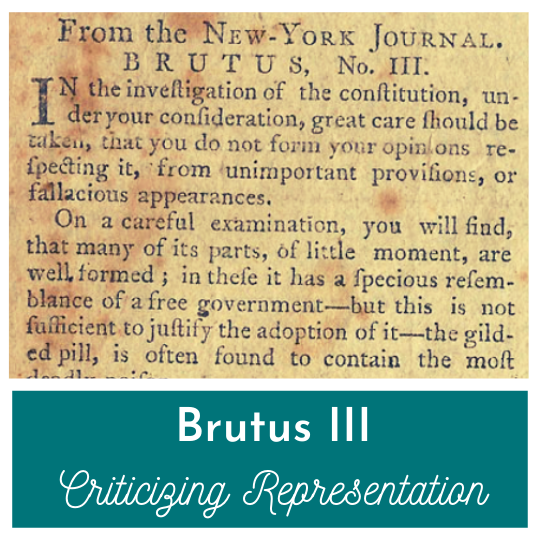Is Representation Truly Representative in the Constitution? - Brutus III
Brutus III was an Anti-Federalist Paper that criticized the was representation was constructed in the US Constitution.
Brutus III
November 15, 1787
Brutus III, an Anti-Federalist Paper by an anonymous author (probably Robert Yates), discusses the means of Representation in the United States Constitution.
This argument reviews why representation in Congress is inherently unfair and why it would lead to a complete takeover of power by the wealthy families of the nation.
Brutus’ focus is on the House of Representatives and its makeup, though he does make time for issues with the Senate as well.
Slavery
Brutus begins his paper by attacking the three-fifths clause, meant to count slaves as a segment of the population.
Brutus stated that slaves were, “held in bondage, in defiance of every idea of benevolence, justice and religion, and contrary to all the principles of liberty, which have been publickly avowed in the late glorious revolution.”
However, slaves were considered property and could not vote.
Brutus questions this from both angles.
If slaves were property, should not others be able to claim their horses and cows as part of the population?
Conversely, if slaves are counted among the population, should they not have a say in who is chosen as their representative?
In Brutus’ estimation, this system gave significantly more power to delegations from southern States than they deserved. Why, for example, should North Carolina get extra representatives if those representatives are obviously not representing the part of the population which added an extra seat to the House?
House of Representatives
Brutus continues his discussion by pointing out that the Assembly of a free government should look similar to that of the people, stating that a foreigner should be able to look at the makeup of the Assembly and gain an understanding of the general population.
This, Butus believed, could not happen under the Constitution.
If you were to add up all the members of the 13 State Assemblies, the number would be around 2000. Meanwhile, the Constitution was going to begin with 65 Delegates in the House.
This was a severe shrinking of representation. Furthermore, he notes that a quorum would be 33 persons and a majority of that would be just 17 people. Seventeen people making decisions for (at the time) 2.5 million.
There was no way the author could imagine an average citizen actually being represented in a government of this nature.
Brutus believed that the opposite was true, with so few positions of power available wealthy families would come together in much the same fashion of European nobles and dominate society.
Senate
Brutus also discusses the curious nature of the Senate.
Why would an equal number of Senators be fair to the people?
Why would little Rhode Island have the same amount of say as Virginia in the upper (and much more powerful) house?
Brutus saw this too as a means to hand power to a few elites in society while suppressing the rights of common citizens.
If you would like to read the original text of Brutus III, click here to get it for FREE.
This series is only part of my regular publications, so…
If you want to keep up with all the Founders, make sure you subscribe to my daily newsletter here:
I’ve also put a lot of time into reviewing the Federalist Papers, so if you want to read more, check them out here:






